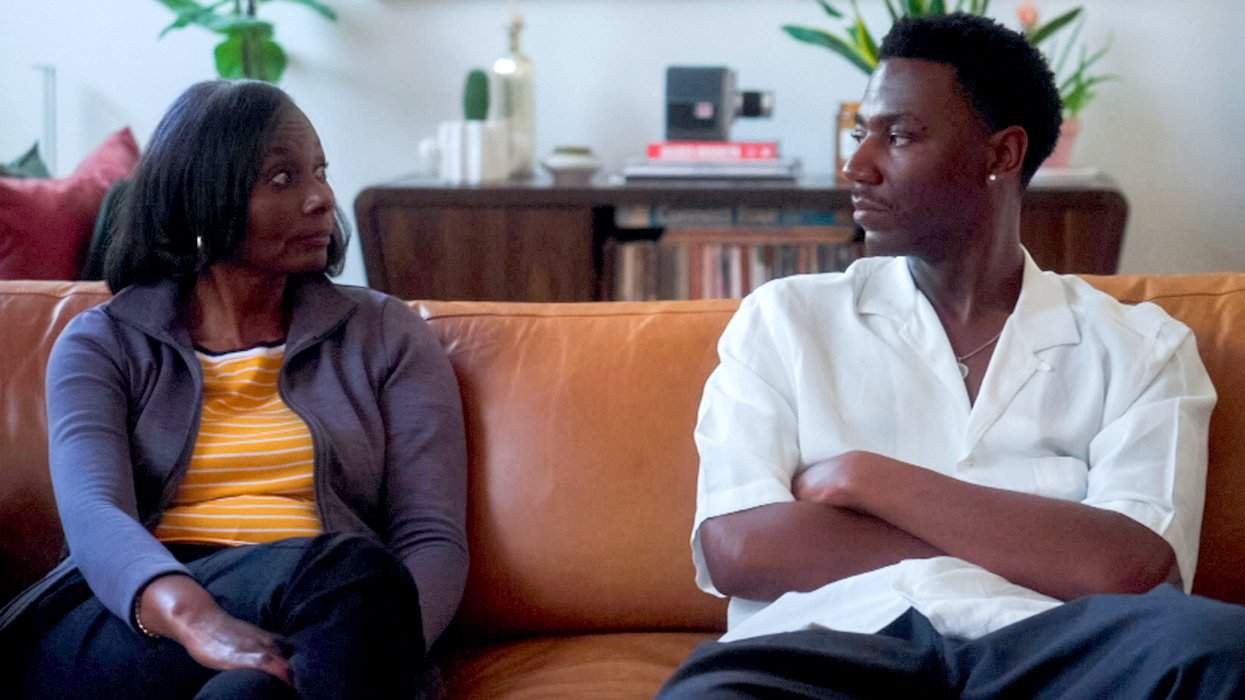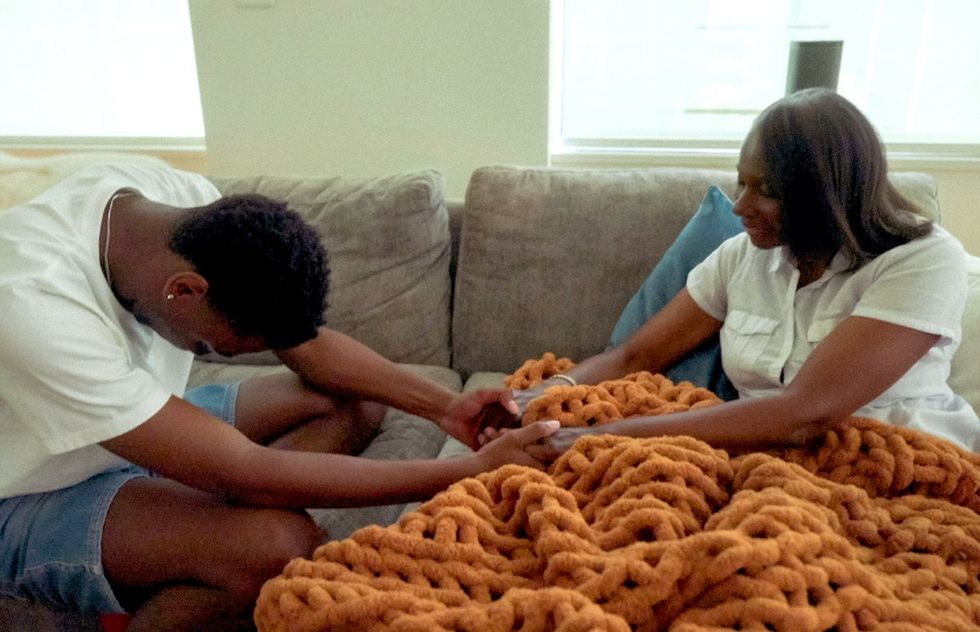I’ve become somewhat of an angst viewer of the Jerrod Carmichael Reality Show. It’s not news to me that a reality series is for the most part being scripted. You need to tell a compelling story that keeps the viewer coming back for more. That rarely happens naturally or by accident. In my opinion, Carmichael does this artfully with his show.
Keep up with the latest in LGBTQ+ news and politics. Sign up for The Advocate's email newsletter.
It can be at once cringe-worthy and sentimental as he explores circumstances that are rarely talked about. Carmichael’s narcissism and rawness provide a disoriented outlook on life.
Having said all that in the best passive-aggressive way I know how, the series' last episode, “Homecoming,” examines Carmichael's relationship with his mom, which bumps right up against the Mother’s Day holiday this coming weekend. As he might say, that particular show is still rattling around in my head.
Carmichael’s mother tells her son that she loves him unconditionally — with conditions. She is religious to an extreme, which is rarely ever good news for a gay man. She feels her son is committing a sin in the eyes of God, which is highly subjective. She also says she supports his lifestyle choice, which is not only offensive but brutally wrong.
What choice does that leave Carmichael on how to have a relationship with his mother? How can you love someone who pretends to love with misplaced love? How do you rectify her choice to put her religion ahead of the love for her son? Why are you forced to choose between your mother and your “lifestyle choice”?
At the end of the episode, Carmichael is frank about these questions, talking about how he thought he’d outgrow his mom and her beliefs once he moved to the big city and made something of himself. But alas, that is not what happened. He says the dilemma with his mother rattles around his head daily with the question “Could my mom change?”
The stereotypical relationship between a gay son and his mother is born of a faraway fallacy for some of us that includes gossip sessions, shopping excursions, parlaying fashion advice, and sharing secrets and intimate conversations.
I have friends who talk to their mom every day. Some have moms who joined their local PFLAG. Others who have moms who hang gay flags on their porches back home. Some moms of my friends come to New York City and demand to go to a gay bar or come for the NYC Pride March every June.
Those of us who have strained relationships with our mothers are often loath to admit how hurtful it is to see those friends who have bonded relationships with their moms. The very essence of unconditional love. What Carmichael did was bring these strained relationships to the forefront for all of us who have the same question rattling around our heads: “Could my mom change?”
Thirty years ago I came out to my mother in less than ideal circumstances. I had returned home to Pittsburgh for the holidays, got wildly drunk, and came out to her by saying, “I bet you don’t know that I’m busy sucking cock in New York City.” She threw me out of the house — who wouldn’t? But she begged me to come home the next day.
 HBO/MAX
HBO/MAX
For reasons that are too complicated to explain here, I’ve never had a close relationship with my mother, ever since my dad died suddenly when I was 12. Do I love her? Of course! But the only time we have ever really discussed me being gay was when I blurted out my offensive coming-out. She’s never taken the time to understand me, understand what being gay means, and understand the struggles and the happiness that come with my sexuality.
It wasn’t like I didn’t try. On one of the three trips my mother has taken to see me in NYC during the last 30 years, I once asked her why she didn’t take an interest in my personal life. Why she never asked me if I was seeing someone. Her response? “Are you seeing anyone?’ That was the one and only time.
Frankly, she has shown disinterest for all my life. When friends of hers find out about the career I’ve had, they are always surprised. “Your mother never talks about you,” I’ve heard more than once.
She is also the type of person who pushes a problem into the back of her mind, hoping it just goes away. That has always been the first clue, to me, that my sexuality is a “problem.”
Yes, she has accepted my partners into her home — well, the three I took home never actually stayed in her home. We stayed at a hotel nearby. “You can have more privacy there,” she’d say. But, I always knew the real reason. Two men could never sleep in the same bed under her roof.
Recently, I came out of a dark tunnel after battling severe depression that included PTSD stemming from some events of my childhood that involved my mother. I’ve tried to keep my distance from her because she has always made me feel “less than”; however, being the dutiful son, which I’ve always tried to be, I called her two years ago in the hope that she had changed.
She didn’t. It was the usual one-sided conversation about her that now includes being wrapped up in Catholicism, with stories about her “close” friends who are clergy who are anti-abortion, pro-Trump, and undoubtedly see being gay as a sin.
Five minutes into the call, I wanted to hang up. I had an overwhelming sense of inadequacy, and I didn’t like it. But, I tried one more time. I asked her if she was reading my columns here on The Advocate. She said no. I asked why, and she came in for the kill: “Because you live in a dark world.”
This is what she says to her gay son, who was battling depression. We haven’t spoken since.
Don’t get me wrong. This is not a woe-is-me tale. The world does not revolve around me. I am far from being a perfect person and a perfect son. I haven’t lived the cleanest, most innocent life. And despite the fact that I overcame severe depression, anxiety, and suicide attempts, I am still a deeply flawed person. Perhaps one who should have more patience for his mother’s shortcomings.
There will be scores of us who will feel perturbation on Mother’s Day, conflicted about how to reach out to their mothers — or even if to reach out at all. It’s to the point now where I text on birthdays and holidays. It’s impersonal, it’s the bare minimum, but it's an acknowledgment. It works for me, and to some degree, I think it works for my mom too.
Voices is dedicated to featuring a wide range of inspiring personal stories and impactful opinions from the LGBTQ+ and Allied community. Visit Advocate.com/submit to learn more about submission guidelines. We welcome your thoughts and feedback on any of our stories. Email us at voices@equalpride.com. Views expressed in Voices stories are those of the guest writers, columnists and editors, and do not directly represent the views of The Advocate or our parent company, equalpride.


 HBO/MAX
HBO/MAX


































































Charlie Kirk DID say stoning gay people was the 'perfect law' — and these other heinous quotes